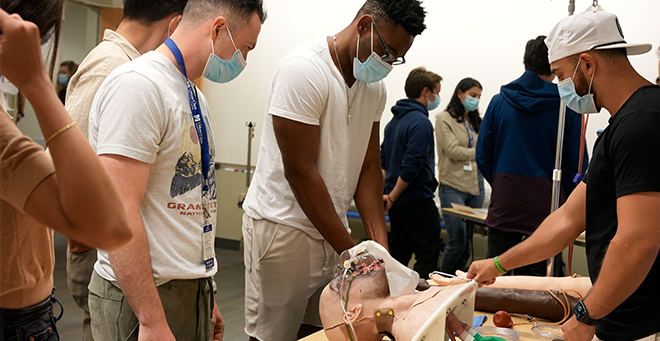
For members of the T.H. Chan School of Medicine class of 2026, there will be many firsts to experience over the course of their time at UMass Chan Medical School.
But the first-year medical students have the singular opportunity of being the first class to experience the T.H. Chan School of Medicine’s new curriculum, Vista.
The Vista name is inspired by the limitless potential the curriculum aims to offer students.
When Anne Larkin, MD, associate professor of surgery and vice provost and senior associate dean for educational affairs, welcomed UMass Chan’s largest medical class in August, she encouraged the new medical students to close their eyes and picture what they imagine a vista to be.
“I hope that what you see in your mind’s eye is an unlimited vision in front of yourself,” Dr. Larkin said. “That’s what we want you to feel about this curriculum. That’s the way we feel, that all opportunities are open for all of us, our faculty and our students.”
Vista at a Glance
The Vista curriculum incorporates a new health system science pillar, in addition to the biomedical and clinical science pillars, and adds health equity, diversity and inclusion, population and community health, and patient and provider wellness to students’ studies.
The health system science pillar includes learning components of high quality and cost-effective care and patient safety. The three phases of the Vista curriculum are discovery, exploration and horizons.
Each phase includes longitudinal biomedical topics that span the curriculum, such as anatomy, cancer concepts, embryology, histology, imaging, nutrition, physiology and pharmacology.
Larkin said the previous curriculum was steady and stable but was antiquated and didn’t integrate the curriculum across all four years.
“We went in with the aim of making that happen, and people were energized for making that switch,” Larkin said. “People saw what the potential was, and we were ready. We had the right people around the table to make the changes.”
There is also a fundamental change in how the curriculum is delivered. Small group teaching is replacing large lectures. Larkin said while portions of Vista’s clinical curriculum are still being built, the new preclinical curriculum is more streamlined than in previous years.
“With Vista, students are going to get going straight out of the gate and start learning about things that actively impact patients,” said Larkin. “And we are enhancing our early clinical experiences so students will participate in those experiences with a higher understanding than first-year students did in previous years.”
Pathways
As each student progresses through the three phases, there is also an underlining support program called Vista pathways, designed to help every student develop an independent inquiry.
“Our hope is that students will gravitate toward something that they believe is going to enhance their career choices, give them extra skills or allow them to explore new and different horizons that they hadn’t initially considered,” said Larkin.
All students will be required to be in a pathway, with the purpose of encouraging curiosity and helping students develop professionally and enhance scholarly skills. Each student will have an advisor and pathway leader.
Accelerated program
Vista will also allow as many as six first-year students the opportunity to apply in late fall to start a three-year accelerated curriculum beginning January 2023. Essentially, these students skip summer break at the end of their first year and instead begin an intensive session to prepare for a family medicine clerkship.
Larkin said the new three-year track allows UMass Chan to have the flexibility to bring in a class as large as it did this school year and address a growing need for more physicians in Massachusetts and across the region.
“That’s really the biggest impetus for us to expand class sizes,” said Larkin. “That fact that there are not enough physicians in many, many specialties, not just primary care, but general surgery, and others such as psychiatry. Many specialties do not have enough physicians right now.”
Related UMass Chan news stories:
Banner first day for T.H. Chan School of Medicine Class of 2026
Tracy Kedian appointed T.H. Chan School of Medicine associated dean for admissions